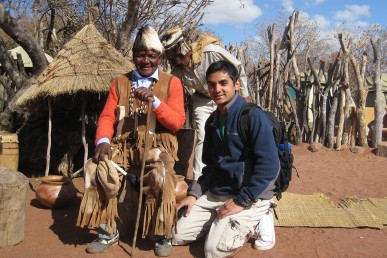Bringing health care to developing nations

Osamah Hasan, pictured with a village elder, studied HIV in Botswana last summer after receiving a Gilman Scholarship for study abroad.
Osamah Hasan’s ambition is to be a globe-trotting physician, bringing primary health care to people in developing nations.
So last summer’s trip to Botswana, in Southern Africa, was made to order.
Hasan was awarded a $4,500 Gilman Scholarship for study abroad. The Council on International Education provided $2,250, UIC paid $1,500 and his parents came up with the $2,500 airfare.
A senior in biological sciences, Hasan chose Botswana because “I wanted to analyze HIV in the context of a developing nation,” he said.
After neighboring Swaziland, Botswana has the second highest HIV infection rate in the world.
“People were dying at an alarming rate,” Hasan said. “They had to do something.”
Botswana is the first African country to supply free medical care, which it can afford because it has the world’s largest diamond reserve — most of it owned by the De Beers Group — and a thriving tourism industry.
Hasan spent seven weeks there, one of a group of 19 students from the U.S. that also included fellow UIC student Carline Joseph.
They were in class six hours for three days a week, and in clinic for two eight-hour days at two sites: in Gaborone, the capital city with a population of 230,000 (10 percent of Botswana’s population), and in the village of Serowe.
One physician treats 40 to 60 patients a day at the urban clinic. A physician in the village sees 30 to 40 over two days of the week. Nurses and health educators assist.
“A language and culture practicum helped me engage with the community,” Hasan said.
Botswana residents, known as Batswana, speak Setswana, a language in which many words have two different meanings, depending on context.
“I was able to pick it up quickly,” Hasan said, partly because he stayed with a family in the village.
“That helped me gain proficiency, to the point I wasn’t shy to speak with patients,” he said.
Although most of the urban patients and about half of the rural ones know English, “when they enter the room and you’re speaking Setswana, it puts them at their ease,” he said. “I was using English too, and a lot of hand gestures.”
As for culture, he learned that every community is different.
“Each tribe has its own culture and customs,” Hasan said. “Putting [Africans] in one category is one of the greatest blunders that we Americans do.”
In their time off, the students visited cultural and heritage sites such as Manyana Rock, scene of thousand-year-old paintings by bushmen.
At shops and flea markets, they bought gifts for their families and Batswana home-stay families.
He started a blog — botswanapublichealth.blogspot — “to encourage other students to go on study abroad,” he said.
Hasan, who is of Indian descent, met Batswana whose ancestors were slaves, brought from India to South Africa or neighboring Zimbabwe in the 1800s.
His experience in the African nation “helped me reflect on the nature of medicine and my desire to pursue a career in it,” he said.
“It gave me a deep insight into how Botswana turned its health care system around. My conviction [to be a physician] has never been stronger, because of this experience.”
After he graduates next year, Hasan hopes to spend a year in Jordan as a Fulbright scholar before starting medical school.
“I’ve seen what Africa is like; now I want to learn about the Middle East,” he said, including the health care system, the culture and the language.
He already knows something of the region, having spent the first 10 years of his life in Saudi Arabia before moving with his family to Glen Ellyn.
He is a peer mentor at his dorm, the Student Residence and Courtyard, where he’s responsible for coming up with an educational program each month. He’s also a member of the Honors College.
As a Muslim, he makes visits to his family in Saudi Arabia that have included pilgrimages to Mecca. He prays five times a day, in his room or at prayer sessions in Student Center East.
Now, about his first name, Osamah: does it cause any comment?
Yes, especially at airports, where security is a priority.
At Buffalo Niagara International Airport, which he passed through while visiting relatives in Canada, an airline employee asked Hasan, “Why don’t you change your name to Oscar?”
gwisby@uic.edu
